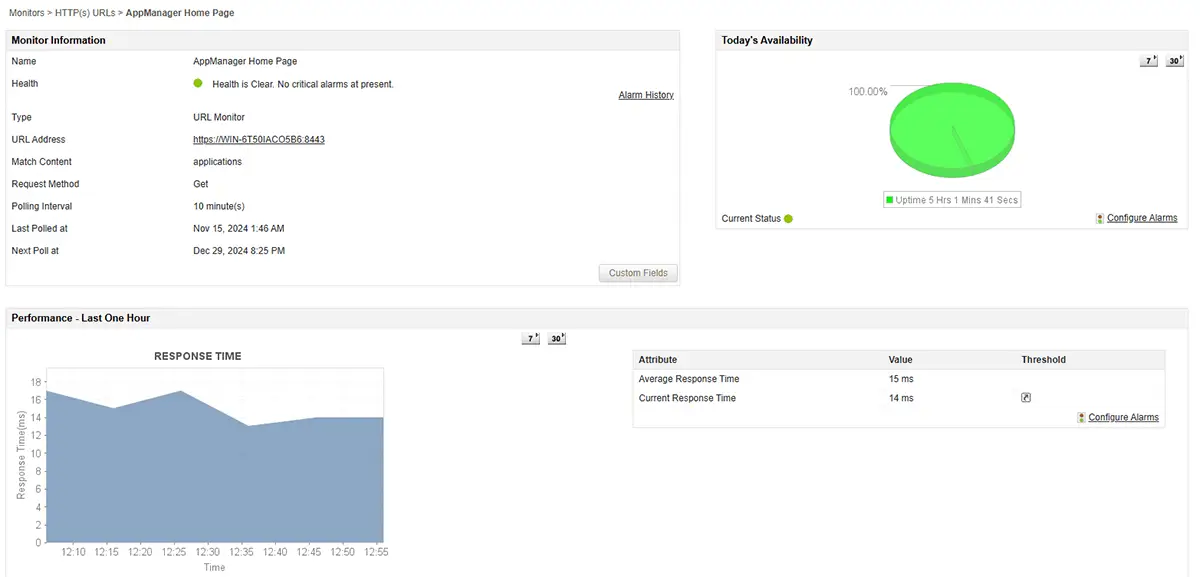In today's digital world, websites play a crucial role in the success of any business. With more and more customers relying on websites for information, transactions, and interactions, it is essential for businesses to ensure their websites are up and running at all times. Any downtime or performance issues can result in loss of revenue, customer trust, and brand reputation.
Applications Manager's support for URL monitoring is designed to help you monitor the performance of your websites and web applications. Monitoring URLs with Applications Manager aids you in proactively identifying and resolving issues that can impact website performance, ensuring a seamless end user experience.
URL monitoring software like Applications Manager's URL monitor enables you to get comprehensive insights into your URL performance with the help of the following capabilities:
Efficiently monitor the health and availability of designated URL webpages, ensuring comprehensive tracking of their performance across both the internet and intranet. Stay proactive in identifying potential outages by promptly detecting them and preventing potential service disruptions. Receive real-time alerts for crucial metrics such as response time, DNS time, connection time, and page size, empowering you to proactively manage your URLs and avert any potential issues.

One of the key features of boosting URL performance is the ability to improve loading times. This means that when a user clicks on a link, the webpage will load faster, resulting in a more seamless and efficient browsing experience. This feature is crucial for websites that want to attract and retain users, as slow loading times can lead to frustration and ultimately, a loss of potential customers. By optimizing loading times, websites can improve their overall performance and provide a better user experience.
Monitor the availability, health, response time, and page size of all the URLs within the sequence for a deeper understanding of a visitor's digital journey through your website. Gain deep insights into individual URLs in a sequence where you can get a detailed performance breakup of each page. Stay alerted whenever any URL is down or unavailable and resolve them before end users get to see them.
Leverage the power of synthetic monitoring to simulate critical user journeys on your website or application that mimic actual user behavior, such as clicking on links, filling out forms, and making purchases. Identify any potential issues or bottlenecks in your systems and proactively address them before they impact real users. This is particularly useful for businesses that rely heavily on their online presence, as it helps ensure a seamless and positive user experience for their customers.
Applications Manager's AI-based alerting capabilities can simplify the process of detecting and resolving incidents by pinpointing potential performance issues in your URL and sending instant notifications for minor deviations in performance. You can use ML-based forecast reporting to predict your URL performance in the future, ranging from months to years and enhance your digital experience. By utilizing AI-based alerting and reporting, you can simplify the process of URL performance monitoring and troubleshooting, and help you to ensure that your URLs are always delivering the best possible experience for your end users.
URL performance isn't just about the web application itself; it often correlates with the underlying backend health. Applications Manager offers unified infrastructure monitoring, allowing you to correlate URL latency with server metrics like CPU usage, memory, or database query performance. This holistic view ensures that you aren't just treating symptoms but diagnosing the root cause of slow URL responses, whether they stem from the network, the code, or the server infrastructure.
The process of URL monitoring encapsulates the task of tracking website parameters, analyzing performance and behavior, alerting in case of issues, and reporting the historical performance to deduce the functioning of websites.
To ensure that your webpages deliver a smooth browsing experience to users, detect any performance issues and resolve it before they become potential business threats. Applications Manager's URL monitoring tool is a perceptive tool which comes with a powerful fault management system and advanced analytics, powered by machine learning techniques, to offer insight into the performance of your websites.
URL monitoring works by periodically sending requests to the specified URLs. A URL monitoring tool like Applications Manager will then check the response code and load time for each request. If the response code is not 200 (OK), or if the load time is too slow, an alert is generated. In addition to checking availability and performance, URL monitoring can also be used to check for specific content on the web page.
It allows us to track crucial metrics such as response times, resource utilization, error rates, and transaction performance. The real-time monitoring alerts promptly notify us of any issues or anomalies, enabling us to take immediate action.
Reviewer Role: Research and Development
Trusted by over 6000+ businesses globally